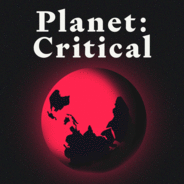Welcome to the sophisticated world of greenwashing.From outright climate denial to tactics of delay, the status quo is rapidly responding to the eco-crisis—just not in the way we need it to. Rather than throw money at an energy transition, tackle runaway capitalism and tax polluters, Big Oil and governments alike are muddying the waters of discourse to eke out every last drop of fossil fuel.Ketan Joshi joins me to explain how this happened. A climate researcher and communications consultant, Ketan is one of the most astute guardians of our future, prolifically revealing greenwashing tactics used to dupe the public by private and state institutions. In this episode, he reveals these and the actions that the fossil fuel industry took to delay national energy transitions, the link between wealth, power and influence, and the root of the inequitable distribution of resources.Planet: Critical investigates why the world is in crisis—and what to do about it. Support the project by becoming a free or paid subscriber.© Rachel Donald This is a public episode. If you would like to discuss this with other subscribers or get access to bonus episodes, visit planetcritical.substack.com

PolitikWirtschaftTalk
Planet: Critical Folgen
Planet: Critical is the podcast for a world in crisis. We face severe climate, energy, economic and political breakdown. Journalist Rachel Donald interviews those confronting the crisis, revealing what's really going on—and what needs to be done. planetcritical.substack.com
Folgen von Planet: Critical
243 Folgen
-
Folge vom 09.11.2023Climate Delay and the Fossil Fuel Industry | Ketan Joshi
-
Folge vom 02.11.2023How Corporations Overthrew Democracy | Matt KennardHonduras is being sued for a third of its GDP by an American company—why?Because the developing nation changed its mind about Prospera building a charter city on its territory. This case, which could bankrupt Honduras, will be judged in a back room of the World Bank by three people, none of whom are obliged to even have a law degree.Matt Kennard, investigative journalist and author of Silent Coup: How Corporations Overthrew Democracy, explains the origin of this shadowy legal system, and how it has infiltrated politics, skews policies, and traps developing nations into exploitative relationships with some of the world’s biggest corporations, definitively undermining the democratic process.Planet: Critical investigates why the world is in crisis—and what to do about it. Support the project with a paid subscription. This is a public episode. If you would like to discuss this with other subscribers or get access to bonus episodes, visit planetcritical.substack.com
-
Folge vom 29.10.2023Dignity and Liberation | lisa minerva luxxGenocide.Israel will not stop until it subsumes the entirety of Gaza and, from the words of their leaders, destroys the Palestinian people.Brave people everywhere are protesting. Many are talking. Some stay quiet, for fear of losing their jobs. A minority around the world firmly believe the rhetoric developed by the Israeli state. The injustice in the Middle East, the violent impunity murdering thousands of civilians, backed by Western powers who blush not at their own hypocrisy, is uniting people all over the globe. This is an uprising against colonialism, against violence itself.lisa minerva luxx, poet, political activist, and member of Palestine Action joins me to discuss the dignity of the Palestinian people, and the dignity they have long been denied. We discuss their right to resist under international law, examining the narrative that passivity could have led to their liberation. We also explore the relationship of the Palestinian struggle for freedom to all other liberation movements around the world, with luxx highlighting the many leaders who fought for freedom using the tools of resistance, including guerilla warfare and sabotage.This is an episode about colonialism, violence, action and love. This is an episode about the reality of the situation in Palestine, and the Israelis and Palestinians suffering under this colonial regime. “Many people have been talking about and been horrified by—but not enough people—the use of “these are human animals”. We heard this before with the persecution of Jews. How are we not learning? Jews were called rats. And that's why so many people allowed for the Holocaust to happen. ‘Oh, well, it's not happening to humans, I can allow it to happen to rats. I don't like rats.’ We allowed for this to happen before. How are we back here?"Subscribe to support Planet: Critical. This is a public episode. If you would like to discuss this with other subscribers or get access to bonus episodes, visit planetcritical.substack.com
-
Folge vom 26.10.2023Exposing UN Greenwashing | Jacob Goldberg“I don't think you want an organisation that is misleading the public about its achievements addressing the climate crisis, to necessarily be the one leading the global effort to do something about the climate crisis.”The UN claims they're "climate neutral"—it couldn't be farther from the truth.A recent investigation done by Mongabay and the New Humanitarian revealed many carbon credit projects the UN buys are linked to protest, rainforest destruction and dispossession of indigenous people. I'm joined by reporter Jacob Goldberg who investigated this story for over a year.Shockingly, he reveals the UN performs no checks on the carbon credits they buy—and did not respond to the reporters once they raised the alarm. As he says during the episode—can we trust an institution that can’t even keep track of the harm it’s doing to really lead the world through the climate crisis?Planet: Critical investigates why the world is in crisis—and what to do about it. Support the project by becoming a free or paid subscriber. This is a public episode. If you would like to discuss this with other subscribers or get access to bonus episodes, visit planetcritical.substack.com
